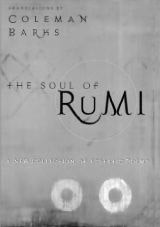THE SOUL OF RUMI: A NEW COLLECTION OF ECSTATIC POEMS
by Jalal Al-Din Rumi, Coleman Barks (HarperSanFrancisco, $28) Elliott Bay Book Co., 101 S. Main, 624-6600 7:30 p.m. Tues., Oct. 16
IN 1978, a Sri Lankan sage gave Coleman Barks a mission: Translate the wisdom of the Sufi poet Jalal Al-Din Rumi (1207-1273) into English.
Though such assignments often lead to discomfort, even danger, it must be said that Barks has not suffered from his. In addition to three book-length collections of excerpts from Rumi’s vast output, Barks is the happy copyright holder of various less expensive repackagings of the same material: an annual Rumi calendar, a Rumi date book/diary, a pocket-sized Rumi for convenient spiritual refreshment, and a set of Rumi audiotapes for automotive meditation.
Most remarkably, he has achieved all this without the inconvenience of learning medieval Farsi, the language in which Rumi (meaning “the man from Rum,” a city in Asia Minor) wrote most of his poems. By his own testimony, Barks has established his veritable franchise merely by spending an hour or so a day with pen, paper, and a few volumes of translations by scholars foolish enough to undergo the drudgery of actually mastering the material he exploits.
The practice of “translating” from tongues one does not in fact command is so widespread today that it’s hardly worth wasting sarcasm on. Besides, when the phony translation’s made by a real poet—Ezra Pound’s “versions” of Chinese lyrics, for instance—the result is worth reading no matter how wildly disimilar it is to the original.
The problem is that real poets usually prefer to invest their efforts in writing their own poetry, not translating someone else’s. So the work of translating poetry normally falls to people more or less constitutionally not up to the job. For every Shelley tackling Goethe (and admitting that his effort was doomed to failure), we get a dozen C. F. MacIntyres.
The real problem with Barks’ Rumi “translations” (some of them fourth hand, Farsi to Turkish to English to Barks) is not that they’re inaccurate but that they don’t stand up in their own right. By Auden’s definition of poetry as “memorable speech,” they’re about as poetic as a shopping list.
RUMI’S VERSE is thick with images, and every once in a while one manages to survive the stumble and clatter of Barks’ English:
What was said to the rose that made it open was said to me here in my chest.
What was told the cypress that made it strong and straight, what was
whispered the jasmine so it is what it is, whatever made sugarcane sweet, whatever
was said to the inhabitants of the town of Chigli in Turkestan that make them
so handsome, whatever lets the pomegranate flower blush like a human face, that is
being said to me now. . . .
But as soon as the language becomes even slightly abstract—and Rumi is as much analytical philosopher as poet—Barks’ ear betrays him into unspeakable guff like:
Would you like to have revealed to you the truth of the Friend?
Leave the rind, and descend into the pith.
In the current volume (Barks promises it will be the last) he does best with a long excerpt from Rumi’s Masnavi, an epic melange of philosophy, obscenity, and symbolic fables, like a collaboration between the Dante of il Paradiso and the Chaucer of The Wife of Bath’s Tale. One doesn’t notice clumsy diction so much when there’s narrative momentum to carry one over it. But with the loosely linked couplets of the Divan poems, Barks constantly lurches from mouth fluff like that quoted above to limp sub-Rod McKuen lyricism worthy of a New Age greeting card:
We sit in this courtyard, two forms, shadow outlines with one soul,
birdsound, leaf moving, early evening star, fragrant damp, and the sweet
sickle curve of the moon. You and I in a round unselved idling in the garden-
beauty detail. . . .
By staying on the exotic camels- and-pomegranates level, Barks rarely allows us a glimpse of the dazzling darknesses beneath where truth lies. Rumi deserves better.
Fortunately, among the supposedly academic translators Barks pillages for his magpie collections, better is to be had. For proof, here are a few fragments of R.A. Nicholson’s rendition of one of Rumi’s most exalted passages:
O lovers, O lovers, it is time to abandon the world. . . .
Why, O travellers, are you asleep?
The sounds before and behind are the din of departure and of the camel-bells;
With each moment a soul and a spirit is setting off into the Void.
From these stars like inverted candles, from these blue awnings of the sky
There has come forth a wondrous people, that the mysteries may be revealed. . . . .
On every side is clamour and tumult, in every street are torches and candles,
For tonight the teeming world gives birth to the world everlasting.
For another view of Barks’s Rumi: http://www.salon.com/people/feature/2001/10/12/barks/index.html








